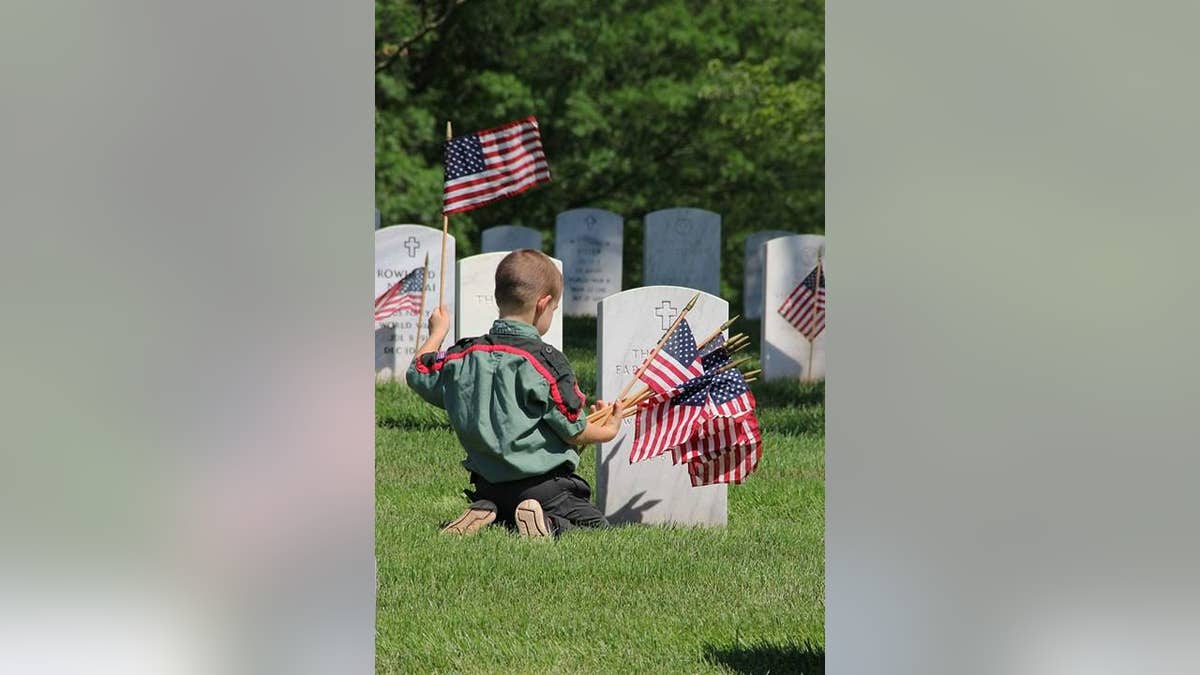
(Courtesy of Trail Life)
At a ceremony on Arlington National Cemetery’s hallowed grounds in 1985, President Ronald Reagan pondered the depths of sacrifice of those who die defending our nation on battlefields near and far.
“The imagination plays a trick,” President Regan said. “We see them like the Founding Fathers, grave and gray-haired.” But he reminded his listeners that most of the fallen were quite young when they died “and they gave up two lives – the one they were living and the one they would have lived.”
For many of the years since President Reagan made this observation, ours has been a nation at war. Flag-draped coffins have been greeted by spouses and young children. Bereaved parents must do the unthinkable and bury their children. The TV news, newspapers and websites have featured the fresh, young faces of men and women who made the ultimate sacrifice on behalf of our country.
Americans know about these terrible losses. But as a young veteran who had just left the Marines, I felt they didn’t care. Then Oakville, Missouri, showed me I was wrong. It happened in June 2010.
My friend, Cpl. Donald Marler, was in Helmand Province in Afghanistan. He and I spoke briefly over Facebook one day. We joked about a mutual acquaintance and our shared dislike for a tactical vehicle known as an MRAP – just a mundane conversation between buddies.
Two days later, I got the call that Don had died when the MRAP he was riding in during combat operations overturned in a canal. He was only 22.
A grateful community paused to honor and remember Cpl. Donald Marler in June 2010. And on Memorial Day, a grateful country does the same for all those who lost their lives protecting our country.
Don was a great Marine. He skipped high school graduation just so he could get to boot camp a little early. In the Marine security detail at Camp David, where I served with him, he filled jobs normally reserved for higher ranking sergeants or staff sergeants.
Don excelled in some of the toughest schools in the Marine Corps. He had volunteered to deploy to Afghanistan and to go on patrol when he was killed.
As I made my way to his funeral, I was cynical. This tremendous guy had died for his country, but I figured only Don’s family and friends, fellow Marines, and perhaps a few veterans at the local VFW would care. I was wrong.
Hundreds of people lined the roads and overpasses to pay their respects as Patriot Guard riders in full force escorted Don’s body to the funeral home. Two trucks from the local fire station raised a flag over I-55.
At Don’s funeral, every pew was full. It was standing room only. On the way to Jackson Barracks National Cemetery, businesses posted signs: “Rest in Peace Cpl. Donald Marler.” Firefighters and police officers turned out to show their respects. People stopped their cars on the side of the road and stood as the casket went by.
The local Holiday Inn provided free and discounted rooms to Marines who came in for the funeral. A rental car company gave us cars to get to the service. I was reminded on this day that Americans know what’s at stake for men and women in uniform. More importantly, I was shown that they honor those sacrifices with their words and their actions.
Don was a warrior. He got his orders changed so he could go to combat. He volunteered for convoys and patrols so he could fight alongside and protect his brothers. He exemplified the Marine motto – Semper Fidelis – always faithful.
On the 66th anniversary of D-Day, Don joined a special group of Americans who stood in the way of tyranny. On this day, we stop to remember those Americans like him who didn’t make it home. Those who gave up the life they would have lived for the lives we are able to live now.
Those men and women knew freedom isn’t free. They were willing to pay the highest possible price for it.
A grateful community paused to honor and remember Cpl. Donald Marler in June 2010. And on Memorial Day, a grateful country does the same for all those who lost their lives protecting our country.
We stand up to protect those who made it home. We honor and care for those who “shall have borne the battle.” We must live our lives in a way that’s worthy of the sacrifices they made for us.




















